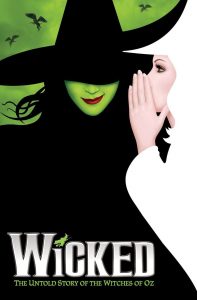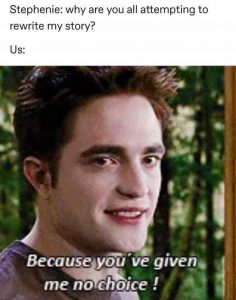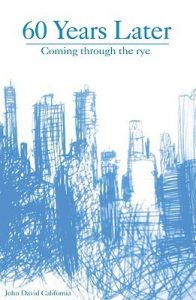
When we’ve fallen in love with a story, a character, or a fantasy land, there is a tendency to want to dive deeper into this fictional universe. The original creative minds may spur out sequels and spinoffs in response to fan demand – or they may not. Either way, it is almost guaranteed that the demand for more will be met by fans themselves through what has been dubbed “fanfiction.”
Fanfiction can take many forms, from a free, short online story to a published novel-turned Broadway production. In each of its forms, fanfiction authors borrow worlds and characters to create storylines that do not exist in the source material.
Creators have mixed responses to this phenomenon. Some authors, like George R. R. Martin, prefer to have exclusive authority over their characters and plot lines.[1] J.K. Rowling is among those who only hope their characters are not used in association with mature or offensive messages.[2] What recourse then do these original authors have when their work is adapted against their wishes?
Copyright law offers protection for an author’s intellectual property. Copyright is the exclusive right to produce, perform, or publish a work or any substantial part thereof (Copyright Act, s 3(1)). Copyright automatically subsists in an original literary work, but only for so long (s. 5(1)). Authors also have moral rights to the integrity of their work, which is infringed where the work is modified to their prejudice (s 28.2(1)).
In Cinar Corporation v. Robinson 2013 SCC 73, the Court noted that a “substantial part” is a matter of fact and degree, such that that copyright can be infringed even where there is no direct reproduction of a single sentence of the original work. In this case, where character personalities and specific visual elements were strikingly similar between a children’s show concept and a produced project, the Court found the latter to reproduce a substantial part of the former. Accordingly, though fanfiction may not equate to posting a free complete version of the source material online, the reproduction of characters, locations, and themes in new stories, if using a substantial part of the original elements of the source material, constitutes a prima facie copyright infringement.
Despite the prima facie infringement, the average fanfiction author on free online forums fortunately faces little risk of legal repercussions for their content. Section 29.21(1)(a) of the Copyright Act states that it is not a copyright infringement to make use of an existing published work to create a new work for non-commercial purposes. The fanfiction author must reference the source author and ensure that the derivative work does not have a substantial adverse effect on the source material, bringing into mind moral rights (Copyright Act, s. 29.21(b), (d)).
The exception of fair dealing is always available for a fanfiction author to raise in a copyright infringement claim, so long as the dealing falls within one of eight enumerated categories in the Copyright Act ss. 29-29.2 and the dealing can properly be described as “fair” (CCH Canadian Ltd v Law Society of Upper Canada 2004 SCC 13). “Fair” should not be interpreted restrictively in order to maintain the balance between the rights of the user and the copyright owner (CCH). What category does fanfiction fall under then? Perhaps satire or parody in some instances, maybe criticism of the original work in others. Maybe still it constitutes a “private study” exercise in creative writing. But then still to ask is “is the dealing fair?” The answer to this question depends on the fanfiction in each individual case, taking into account the factors stated in CCH.
Consider the following fanfiction examples, through which we can understand various options available to fanfiction authors and authors of original works alike when it comes to copyright law:

- While borrowing from a new hit series may cause trouble, certain fanfiction may not infringe copyright law depending on the age of the source material. For example, Wicked: The Life and Times of the Wicked Witch of the West is a 1995 revisionist literature novel by Gregory Maguire. Wicked can be properly dubbed a fanfiction, considering the characters and world are adapted from the 1900 children’s book, The Wonderful Wizard of Oz by L. Frank Baum. How is it then that Maguire is not infringing copyright? The answer lies in section 6 of the Copyright Act: copyright only subsists for 70 years after the life of the author. Baum passed in 1919, meaning Oz was well within the public domain by the time Wicked was published.
 Fanfiction authors of recent material who want to commercialize their works may need to make significant alterations to make their fanfiction an original work in and of itself. In doing so, the principles of Cinar must be kept in mind; the differences must be so great that the new work, viewed as a whole, is no longer an imitation or reproduction of the original creator’s skill and judgement. An example of this being done quite successfully is E.L. James’ romance novel Fifty Shades of Grey, which notably began as a fanfiction of Stephanie Meyer’s Twilight. [3] By aging up the characters, changing the names and setting of the story, and removing the fantasy elements of Meyer’s work, James not only created an original work with subsisting copyright, but also avoided infringing any of Meyer’s moral rights, considering the two works have marked departures on attitudes towards sexuality.
Fanfiction authors of recent material who want to commercialize their works may need to make significant alterations to make their fanfiction an original work in and of itself. In doing so, the principles of Cinar must be kept in mind; the differences must be so great that the new work, viewed as a whole, is no longer an imitation or reproduction of the original creator’s skill and judgement. An example of this being done quite successfully is E.L. James’ romance novel Fifty Shades of Grey, which notably began as a fanfiction of Stephanie Meyer’s Twilight. [3] By aging up the characters, changing the names and setting of the story, and removing the fantasy elements of Meyer’s work, James not only created an original work with subsisting copyright, but also avoided infringing any of Meyer’s moral rights, considering the two works have marked departures on attitudes towards sexuality.

- Fanfiction authors who commercialize their work may otherwise be a target for copyright infringement claims. J.D. Salinger, author of The Catcher in the Rye, was famously protective over his copyright in this work and refused the rights to adapt the novel into dramatic works on many occasions.[4] When in 2009 an unauthorized sequel, 60 Years Later: Coming Through the Rye was published, Salinger responded with an action to permanently enjoin this work’s reproduction and dissemination in the United States.[5] Salinger was successful in this action, though paperback copies of the unauthorized sequel are still available in Canada.
[1] https://www.youtube.com/watch?v=u5g9-pfIImw
[2] http://news.bbc.co.uk/2/hi/entertainment/3753001.stm
[3] https://www.forbes.com/sites/hayleycuccinello/2017/02/10/fifty-shades-of-green-how-fanfiction-went-from-dirty-little-secret-to-money-machine/?sh=5551539f264c
[4] https://archive.nytimes.com/artsbeat.blogs.nytimes.com/2010/01/29/why-j-d-salinger-never-wanted-a-catcher-in-the-rye-movie/
[5] https://www.wsj.com/public/resources/documents/salingersuit.pdf
 Copyright & Social Media
Copyright & Social Media Communications Law
Communications Law
Hello fellow fanfic reader!
Another issue potentially raised by fanfiction, particularly within Canada is the issue of moral rights. What recourse do authors have when their fans so mischaracterize the character or does something that goes against the morals of the author themselves? An example of these would be the proliferation of smut fanfics, particularly those tagged “Dead doves: dont’t eat” (a reference to the Parks and Rec episode). As the most popular fanfiction site does not set any guidelines on what is allowed and what is not, often times works containing extreme violence and sexual abuse gets published, even in association with works originally intended for children (the MLP fandom being an infamous example). However the question of whether copyright law should be the tool indealing with these issues of child protection arises along with the implication of using it as a sword in applying moral standards.
Another question comes up with AU where the subject matter is so far removed that other than sharing the same name as the characters and maybe some personality traits, the fanfiction is ultimately its own original work.
This is a great post Sarah! I think that Section 29.21(1)(a) of the Copyright Act strikes a fair balance in allowing fan fictions to be created. So long as the fan fictions being created are not for commercial purposes, I see no reason why fans of a franchise should not be able to indulge in creating fan fiction. One instance that comes to mind for fan created projects is how some video game franchises, such as Sonic The Hedgehog, have fan games made to honour the spirit of the franchise, while adding unique twists to the formula. So long as projects like this are not made for commercial purposes, creators of fan fiction should be free to create as they see fit.